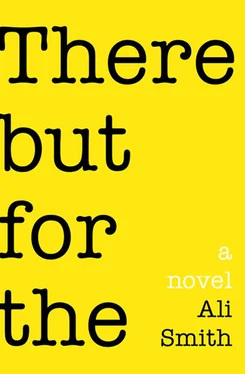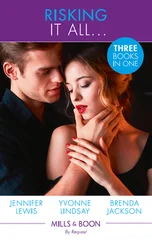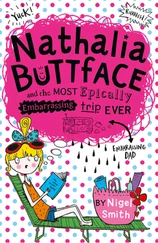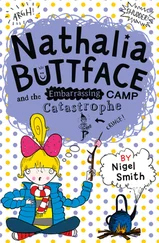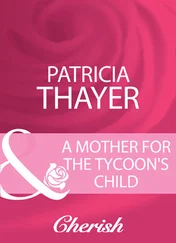The water inside the iron on the ironing board makes a small impatient noise.
Jennifer, there is no way in a million you’re going to burst into flames, May says.
It’s not me I’m worried about, Jennifer says.
You’ve not to think about such things, May says. If you thought about such things you’d go mad. And the worst thing about worries is, they’re contagious.
How are they contagious? Jennifer says.
What I mean is, if you worry, May says, then I have to worry too.
Jennifer looks desolate. She climbs off May’s knee and goes and stands by the sink.
In the future, she says, I will keep my worries in the confines of my own head.
God and all the angels only know where she got that from. She is quite a child for the saying of things strangely. It’s my life too, you know, is what she said in the middle of an argument they were having about breakfast cereal, and that was when she was barely four years old. May had had to turn round, turn away, so her child wouldn’t see her laughing. And another time, last year, she’d just turned seven. What if, when we’re praying like to St. Anthony about things being lost, what if the being who hears us and sees us and helps us isn’t St. Anthony at all but is Rascal the dog? Recently too she’s started refusing to take her mother’s hand if they’re crossing a road.
May pats her knee. Jennifer gives in, comes back and climbs back up. But her head is hot under May’s chin, too heavy against her chest. The weight of her is sullen, maybe settling in for the afternoon if May’s not careful.
The iron sighs on the ironing board again.
Could be quite good, mind you. If you burst into flames, May says.
Good? — if—? Jennifer says lifting her head.
Especially if you were on horseback, May says. You on that Shetland pony, what’s its name, going over the jumps. You’ll be all lit up like a bonfire on horseback at the Summer Fête at the Park.
Ha! Jennifer says.
Instead of the Hoop of Fire, May says, the police dogs would be wanting to jump through you.
Actually, Jennifer says, something like that would be pretty groovy.
She sits forward. But then she drops her head again.
What now? May says.
Because what if I was doing the jumping at the Fête and I looked up at the seats in the spectator stand for you to see me doing it, Jennifer says muffled against her cardigan.
Uh huh? May says.
And there was no you there, Jennifer says.
May nods.
Tell you what, she says with her mouth against the parting of her girl’s hair. If I spontaneously combust I’ll send my arms and legs by themselves to the park to watch you do it.
Finally she has made Jennifer laugh.
They’ll need a seat each, mind, so that makes four seats. And you can pay out of your pocket money. That’s only fair, May says.
Jennifer is laughing out loud now.
And I’m only letting you go to that Fête in the first place if you’ll hold my hand when we cross the road, May says. And my other hand. And my arm. And my other arm. And my leg. And my other leg.
When Jennifer is properly helpless with laughter May shifts her legs like you do when you’re playing the horsey game with a very small child, the bit where they think they’re going to fall but know all the same that you’ve got them safe.
She catches her youngest at exactly the moment of letting her go.)
May Young eyed the strange girl there in the chair. The nails of both her hands were purple with varnish and far too long for properness. She was pressing the little buttons in the thing in her hand. It was as if the whole world was in thrall to the things. They all had them, used them as readily, as meekly, as May was supposed to take the stuff off the medicine cabinet. They swallowed it, hook and line. It was all supposed to be about how fast things were; they were always on about how fast you could get a message or how fast you could get to speak to someone or get the news or do this or that or get whatever it was they all got on it. And at the same time it was like they were all on drugs, cumbersome like cattle, heads down, not seeing where they were going.
The girl thumbed and fingered away at her own world in her hand like it didn’t matter that she was in May’s hospital room, or in anyone’s hospital room, on earth, in heaven, wherever. It didn’t matter where in or out of the world she was.
Maybe she was on a, what was it, scheme, a school scheme, the things they make them do instead of schoolwork, to visit people in hospital, to go and be visitors for people who got no other visitors.
But May had plenty of visitors. She’d no need for a girl on a school scheme. They were always endlessly coming, May’s visitors, and standing about round the bed. She’d no need for strangers to do it too.
Maybe she was a friend of Patrick’s girls and was doing a good turn for the Girl Guides, visiting an old person and getting a badge.
Maybe it was like when they came round singing to people in the hospital, like with the Christmas carols. Not just Christmas neither, because it was weeks after Christmas now and they’d been round again, they were round not that long ago singing their jolly song, on and on it went, interminable, about I am Jesus and they crucified me, and then they hung me up on a tree, all the details of the blood and the nails. It was January, nowhere near Easter. There was no excuse for it.
She lifted her hand and made to wave the girl away.
I’m not needing visitors, she said with her hand. You’re free to go.
The girl in the chair saw May’s hand move. She looked up from the thing she was holding in her own hand. She reached up to an ear and took the thing in her ear out.
Woke up, then, the girl said.
The girl spoke loudly and clearly.
May glared at her. She leaned forward. She wasn’t some old lady who was always asleep with her mouth open, some old lady who couldn’t hear.
She reached out for the jug and she didn’t miss, she got it, by the handle.
Want me to do that? the girl said.
May looked her a stony look. The girl was clearly some kind of do-gooder, and if not, she was a thief. Well, May had no money in her purse. Her watch, in the locker, was worth next to nothing, £17 it had cost, at the airport once. The girl would soon find out there was nothing here for her to take.
May put down her hand on the wool blanket. It had the Kleenex with their medicine in it on the blanket. She opened the hand. She let the Kleenex go. The old hand lifted. It wavered towards the plastic tumbler. She got it. She brought it back to the jug and put the pouring place against its lip. She poured herself the juice. It went more or less safely into the tumbler. She reached and put the jug down, and not just down but in the right place.
Then she looked the girl in the eye.
That girl looked right back.
It is Mrs. Young, right? the girl said. If you’re not Mrs. Young, tell me. I’m supposed to sit with a Mrs. Young.
She waved a piece of paper at May.
Please make sure someone visits Mrs. Young of twelve Belleville Park, the girl said. If you’re Mrs. Young, you took some finding, but we did it, we found you. That’s if you’re actually her, like.
Now May Young knew who that girl was.
What Philip had seen, when it was his turn, was a man in a suit standing at the back of the room. Hello, who’s the chap? he’d said, and May had turned and seen nobody there. May’s own mother had seen a man too. That man’s back, she’d said. Where? May and Philip had said, what man? May’s mother was on morphine. There, she’d said nodding towards the window, but he’ll not do any harm. May and Philip had looked. Nobody there.
So it was true. This was how it happened. They sent strangers, not people you knew. They’d sent her a girl instead of a man in a suit. They’d not sent Jennifer, because Jennifer wouldn’t be a stranger, but they’d sent her a girl the age of Jennifer.
Читать дальше
